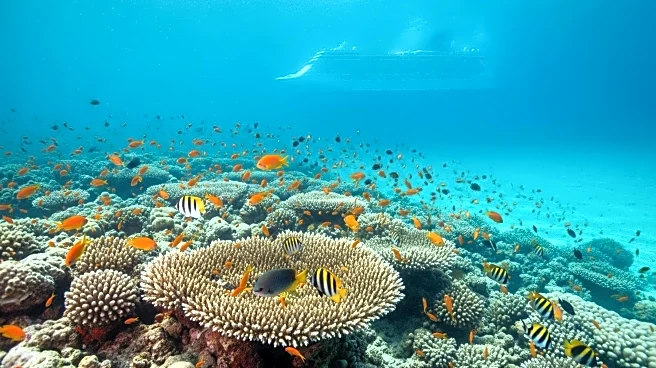What is the story about?
What's Happening?
The Galapagos Islands, a UNESCO World Heritage Site, are experiencing significant environmental challenges due to a surge in tourism. The islands, known for their unique ecosystems, have seen an influx of visitors facilitated by platforms like Airbnb. This increase in tourism has led to economic benefits but also poses risks to the fragile environments. In Puerto Ayora, the most populated town, the growth in tourism has resulted in crowded beaches and trails, increased waste, and disturbances to local wildlife. The rise in informal accommodations, often bypassing environmental regulations, exacerbates these issues. The islands' natural resources, such as drinking water, are under pressure, and local fishermen report declining catches due to potential overfishing.
Why It's Important?
The situation in the Galapagos Islands highlights the delicate balance between economic development and environmental conservation. While tourism is a major economic driver, it threatens the ecosystems that attract visitors. The islands' unique biodiversity, including species found nowhere else, is at risk. The economic benefits of tourism often favor international corporations, leaving local communities with job instability and higher living costs. The environmental strain from uncontrolled tourism could lead to long-term damage, affecting biodiversity and the islands' global significance as a 'living laboratory of evolution.' This scenario underscores the need for sustainable tourism practices to protect fragile ecosystems worldwide.
What's Next?
To preserve the Galapagos Islands, measures such as limiting visitor numbers, enhancing accommodation inspections, and promoting environmental education for tourists are essential. These steps aim to balance development with conservation, ensuring the islands retain their unique nature. The situation serves as a precedent for managing other fragile ecosystems, emphasizing the shared responsibility of protecting biodiversity. Without intervention, the islands risk losing their ecological integrity, highlighting the urgent need for sustainable tourism policies.
Beyond the Headlines
The challenges faced by the Galapagos Islands reflect broader issues in global tourism, where economic interests often clash with environmental conservation. The islands' situation illustrates the potential consequences of prioritizing short-term economic gains over long-term ecological health. This case emphasizes the importance of integrating environmental considerations into tourism planning and policy-making to ensure the sustainability of natural resources and biodiversity.















